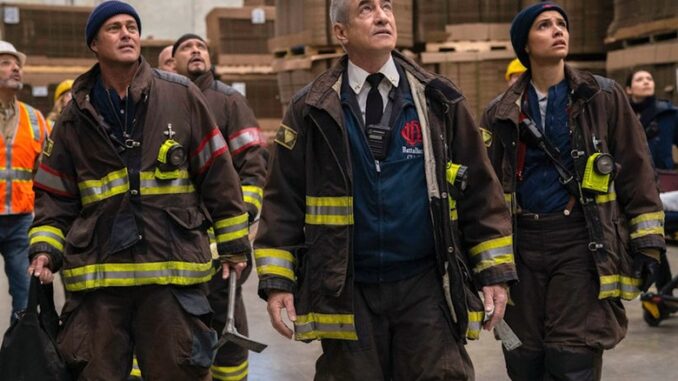
Is Mouch Going to Leave Firehouse 51 on Chicago Fire? What We Know
The siren’s wail, the camaraderie forged in fire, the ever-present threat of danger – these are the hallmarks of Chicago Fire. But beyond the thrilling rescues and dramatic infernos, it’s the enduring presence of its beloved characters that truly anchors the show. Among them, Randall “Mouch” McHolland stands as an almost mythical figure: the seasoned veteran, the union rep, the purveyor of wisdom and dry wit, and often, the comedic relief. Yet, for seasons now, the specter of Mouch’s departure, often whispered about through health scares or musings on retirement, has hung over Firehouse 51 like smoke from a dying ember. The question isn’t just a fan theory; it’s a dramatic device woven into the fabric of the show, consistently asking: Is Mouch going to leave Firehouse 51? Based on what we know from the show’s narrative trajectory and the character’s intrinsic role, a permanent departure, while always a narrative possibility, seems increasingly unlikely – precisely because Mouch is the show’s enduring heart.
The case for Mouch leaving is, at first glance, compelling and rooted in realism. He is, by his own admission and visual cues, the oldest active firefighter at 51. The physical toll of the job, already immense for young, agile firefighters, is exponentially greater for someone of Mouch’s age. The show has masterfully illustrated this through a series of increasingly severe health crises. From minor injuries that put him on light duty to the harrowing heart attack suffered in the Season 11 finale and subsequent recovery in Season 12, each incident served as a stark reminder of the fragility of life and the body’s limits. These events naturally spark conversations about retirement, not just among his colleagues but within Mouch himself, and certainly from his ever-supportive wife, Sergeant Trudy Platt. The dialogue often circles back to the idea of a peaceful life away from the sirens, perhaps a cabin by the lake, or simply more time at home. In a world where characters do leave – sometimes tragically, sometimes for new opportunities – Mouch’s age and health make him a prime candidate for a natural, if bittersweet, exit.
However, the powerful counter-argument against Mouch’s departure lies in his very essence: he is the unwavering soul of Firehouse 51. Mouch isn’t just a character; he’s an institution. He’s the one who offers a cynical but comforting word of advice, the one who knows every obscure union bylaw, the one who brings an unexpected moment of genuine emotion to the most intense scenes. His long-standing relationships with Chief Boden, Herrmann, Severide, and even the departed Casey, form the foundational bedrock of the firehouse’s familial structure. He’s been through it all with them, from the triumphs to the tragedies, and his presence provides a sense of continuity and history that is irreplaceable.
More crucially, the show has consistently shown Mouch’s profound inability to truly separate himself from the job he loves. Every health scare, every contemplation of retirement, has culminated not in his exit, but in a renewed, fierce determination to return to duty. After his major heart attack, for instance, his time on light duty was characterized by restless boredom and a desperate longing to be back in the action, proving his value and his belonging. His identity is inextricably linked to being a firefighter at 51. Without the firehouse, Mouch, the Mouch we know and love, simply wouldn’t exist in the same meaningful way. His return to full duty after his most serious health scare underscores this point: the narrative consistently steers him back to where he belongs, defying expectations of a graceful exit.
Furthermore, Mouch’s marriage to Trudy Platt is another anchoring element. Their unique, often hilarious, and deeply loving dynamic is a beloved crossover feature of the One Chicago universe. Both are deeply entrenched in their respective jobs in Chicago. For Mouch to leave, it would likely mean Platt would have to leave her distinguished career with the CPD, a scenario that seems equally improbable given her character’s deep roots and importance on Chicago P.D. Their combined presence grounds them firmly in the city and their respective professions.
Ultimately, the recurring “Is Mouch leaving?” question serves a vital purpose for the show. It’s not just a tease; it’s a narrative device that injects realism and raises the emotional stakes. It reminds viewers of the brutal reality of a firefighter’s life – the constant danger, the physical strain, and the eventual need to hang up the gear. By continually bringing Mouch back from the brink, Chicago Fire reinforces its core themes of resilience, loyalty, and the unbreakable bond of family forged in the line of duty. Mouch’s continued presence, despite the odds, is a testament to the idea that some spirits are too fierce, some connections too strong, to be easily broken.
In conclusion, while the threat of Mouch’s departure from Firehouse 51 will likely continue to be a dramatic beat in Chicago Fire, all the available narrative evidence points to his enduring presence. His deep connection to the firehouse, his unwavering love for the job, his consistent triumphs over adversity, and his integral role in the One Chicago universe make a permanent exit, especially one devoid of a truly conclusive, character-altering narrative arc, highly improbable. Mouch isn’t just a character on the show; he is Firehouse 51’s collective memory, its steadfast humor, and its beating heart. And for as long as Firehouse 51 stands, it seems Mouch will be right there with it, grumbling, advising, and always, always coming back.
